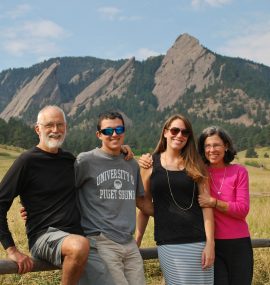Exercise is widely cited as the biggest thing you can do to improve your health – but is it?
Some respected scientists don’t think so.
Award-winning author Sherwin Nuland in his book The Art of Aging quotes Dr. Leo Cooney of the Yale School of Medicine as follows:
But exercise is not the Holy Grail. If there’s a Holy Gail, it’s relationships with other people. In fact if you have to decide between going to the gym and being with your grandchildren, I’d choose the grandchildren.
In 1984, the John D. and Catherine T. Mac Arthur Foundation recruited a group of researchers and initiated a series of aging-related projects. The MacArthur Foundation Study on Successful Aging plowed new ground in the field of gerontology. John Rowe and Robert Kahn summarized hundreds of research reports in their book Successful Aging. These authors highlight the benefits of social support.
In 1921 by Stanford University psychologist Lewis Terman recruited 1,500 bright California fifth graders and followed them over the years. When Terman retired, other researcher took up the mantle. Howard Friedman and Leslie Martin summarized 80 years of research in their book The Longevity Project. In it they say: … social relations should be the first place to look for improving health and longevity.
The Harvard Grant Study of Adult Development began in 1939 when a group of sophomore men joined the study. Additional sophomores joined through 1944. Over the ensuing decades, a mountain of data accumulated for these research subjects. George Vaillant’s book, Triumphs of Experience, chronicles the lessons that he and other researchers gleaned from the first 75 years of the study. Of the many lessons learned, Vaillant believes that the positive effect of a warm, supportive childhood rises to the top.
The National Geographic Society commissioned Dan Buetter to investigate communities around the world that had a high proportion of centenarians. He found what he called ‘Blue Zones’ five places: Sardinia, Okinawa, Costa Rica, Greece, and Loma Linda, California. Of the factors that accounted for the presence of so many 100-year-olds in one locality, only social relationships was common to all five Blue Zones.
We humans are social animals. We have been programmed by our evolutionary history to be social beings. Research shows that people who develop a wide network of social support enjoy a myriad of health benefits. Those include higher quality of life, reduced risk of premature death, cardiovascular disease, cancer, dementia, depression, alcoholism, infectious disease, arthritis, and shorter recovery time following surgery.
How might social support lead to greater longevity and better health? Two possible pathways are better health behaviors and psychological processes linked to appraisals, emotions, moods, or feelings of control. Better health behaviors could include exercise, better eating, or not smoking. The psychological process of re-appraisal could help defuse stressful situations, among other things.
On the flip side, social isolation and loneliness predict bad outcomes. These include higher risk of premature death and functional limitations in older people.
If you want to improve your health and well-being, do yourself a favor by cultivating a network of social support.








